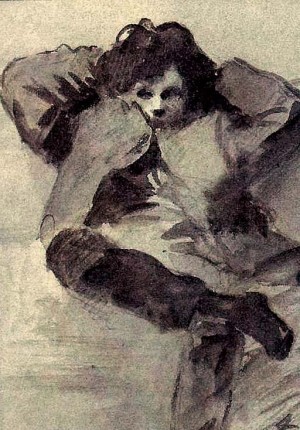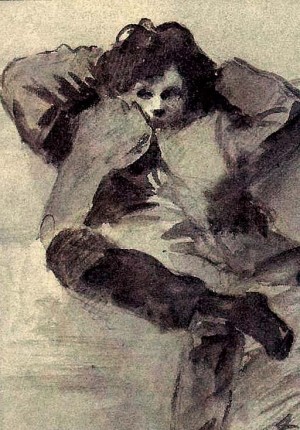Why Translate?
by Darren Jackson
February 22, 2014
My friends often ask me “why translate?” with varying reasons for why not. My favorite is that Google can do it much more quickly, entailing as it does the criticism, “what use are you?” One friend, an architect, argues that Google performs at about 90 percent accuracy and that is good enough. And for his purposes, it is. There are basically two approaches to translation: what I will call here the literal and the expressive. Machines are capable only of the literal approach, which is sufficient for most tasks. However, I contend that literary translation is a special category, one for which the literal approach may not be sufficient.
Take the first two paragraphs of Rimbaud’s prose poem, “A Season in Hell,”

for example. The syntax is straightforward and it lacks any effects such as rhyme or meter:
Jadis, si je me souviens bien, ma vie était un festin où s’ouvraient tous les cœurs, où tous les vins coulaient.
Un soir, j’ai assis la Beauté sur mes genoux. —Et je l’ai trouvée amère. —Et je l’ai injuriée.
Translated by Google, it becomes:
Once, if I remember well, my life was a feast or opened all hearts, or vines all flowed.
One evening, I sat Beauty on my knees. —And I found her bitter. —And I cursed.
That seems to meet my friend’s 90 percent assessment, and more of the rhythm has survived than I would’ve expected. Compare that to Louise Varèse’s classic 1945 translation:
Once, if I remember well, my life was a feast where all hearts opened and all wines flowed.
One evening I seated Beauty on my knees. And I found her bitter. And I cursed her.
The similarity demonstrates a shared approach with an emphasis on the literal level of language. Unlike Google, Varèse’s translation maintains the coherence of the original voice as well as its suggestive power simply by rendering the direct objects that Google leaves out. Bertrand Mathieu’s more recent work (1991) presents another approach:
A while back, if I remember right, my life was one long party where all hearts were open wide, where all wines kept flowing.
One night, I sat Beauty down on my lap.—And I found her galling.—And I roughed her up.
Mathieu makes Rimbaud new again for an audience whose use of language had changed enough for Varèse’s voicing to seem old-fashioned (as Mathieu’s “galling” does now). I would also point out that Mathieu’s choice of “roughed up” for “injuriée” might take too much license, changing the gesture from insult to assault.
What if we test a traditional sample—something in rhymed, metrical lines with more complex syntax and other effects. For this experiment, I’ve chosen the first stanza of Paul Valéry’s “Le Cimetière marin”:
Ce toit tranquille, où marchent des colombes,
Paul Valéry. By Pierre Choumoff, via Wikimedia Commons.
Entre les pins palpite, entre les tombes;
Midi le juste y compose de feux
La mer, la mer, toujours recommencee
O récompense après une pensée
Qu’un long regard sur le calme des dieux!
Translated by Google, it becomes:
This quiet roof, where doves walk,
Between the pines throbs between the graves;
Just composes the afternoon lights
The sea, the sea, constantly renewed
O reward after a thought
A long look at the calm of the gods!
Suddenly Google’s performance drops below that 90 percent mark—in this case, I’d say closer to 50 percent accuracy, and I’m not addressing any of those features, such as sound patterns, that account for much of the beauty in the original language.
C. Day Lewis’s 1932 translation demonstrates the literal approach to translation again, yet here we can see the difference between human and machine more clearly than in the Rimbaud examples:
This quiet roof, where dove-sails saunter by,
Between the pines, the tombs, throbs visibly.
Impartial noon patterns the sea in flame –
That sea forever starting and re-starting.
When thought has had its hour, oh how rewarding
Are the long vistas of celestial calm!
The difference between Lewis’s work and Google’s is striking. Ironically, this 80 year old translation defies one of my contentions regarding the role of translation: that each generation recasts a work in its own linguistic light. For fun, let’s compare this to a contemporary rendering—Tony Brinkley’s translation, published in the Summer 2011 issue of Cerise Press:
This tranquil roof, this quiet ceiling where doves
march among the graves, among fluttering pines —
midday, the just moment, writes in fires —
sea, the sea always — once again beginning —
recompense after thinking — the prolonged
regard across the quiet of the gods!
Brinkley’s approach might be described as expressive as opposed to literal as he attempts to recreate the same experience in a different language with different sounds and associations. While some things are inevitably “lost in translation,” focusing on the losses obscures the work of good translation, which is to find another way to produce the original effect for the reader in a new language. In “Reading Valéry in English,” Brinkley’s essay accompanying his translation, he discusses the inability of English to produce the same homonym of toit for toi, roof for you (or “thou” as he says), and describes his reasoning for the liberty he takes with with the poem’s first line: “For me the repetition is a kind of notice, a way of noticing, that the English is only a translation because repetition (as Wordsworth said) can be a way of indicating as an excess what the words themselves cannot say.” Negotiations like this require making the kinds of choices a machine cannot make and demonstrate why literary translation will remain essential work.
ABOUT THE AUTHOR
Darren Jackson’s poems and translations have appeared or are forthcoming in Circumference, The Pinch, The Laurel Review, The Offending Adam, Bluestem, and other journals. He has translated Life in the Folds by Henri Michaux (Wakefield Press, forthcoming Fall 2014); “The White Globe,” an essay by Bertrand Westphal, forthcoming from Northwestern University Press in The Planetary Turn: Art, Dialogue, and Geoaesthetics in the 21st Century; and A Free Air by Albane Gellé. He also collaborated with Marilyn Kallet and J. Bradford Anderson on the translation of Chantal Bizzini’s Disenchanted City (Black Widow Press, September 2014).






